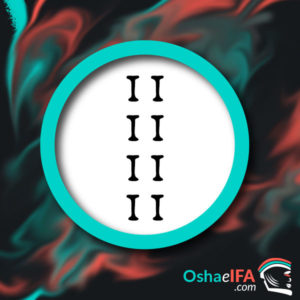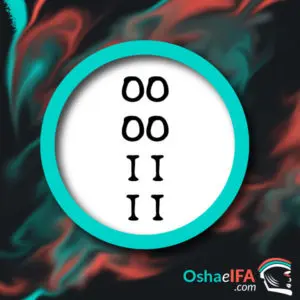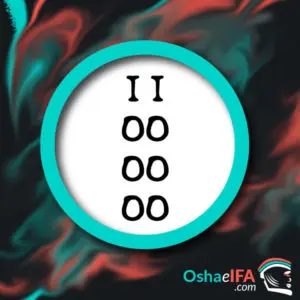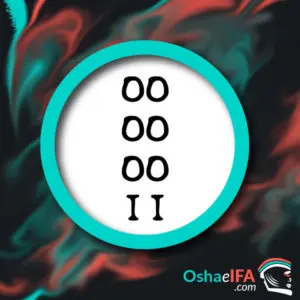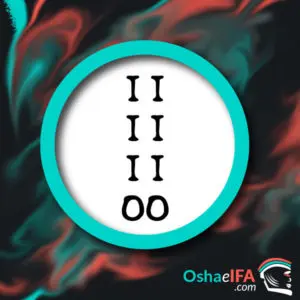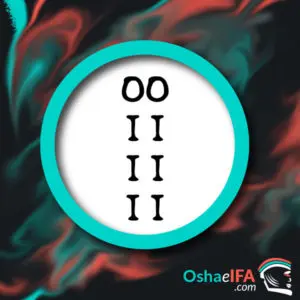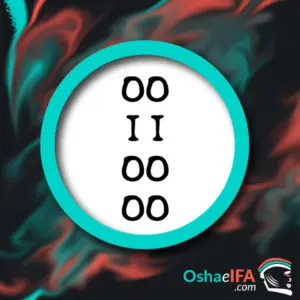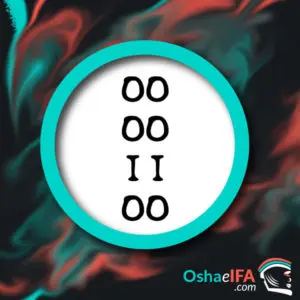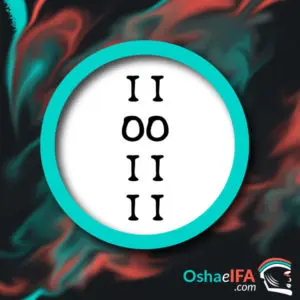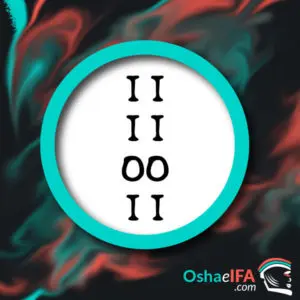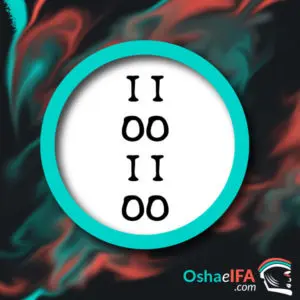Ofun Meyi: Meaning, Tips, Sayings, Traditional and more
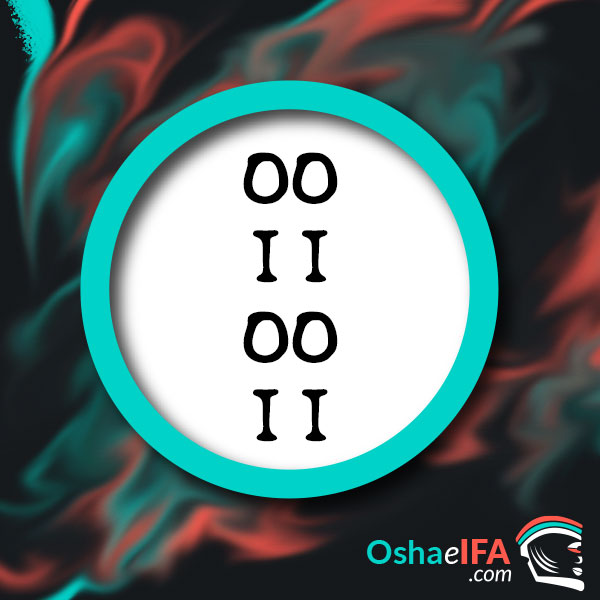
While Ejiogbe is the father, Ofun Meyi (also known as Oragun) is the mother of the remaining fourteen Odus Mejis and the two hundred and forty Omoluos. From Ejiogbe and Oragun a total of two hundred and forty-four basic Ifa Odus depart, as well as four thousand ninety-four composite Odus.
In the odu Ofun Meyi is born:
- Silver (metallic money) and paper money.
- The Alukin Ifá (they use the Ikines to obtain the Odu Ifá.)
- Financial seriousness at the cost of living.
- That the fruits and seeds fallen at the foot of the trees are born.
- The mortuary oaths, heaven judges and gives punishment to the one who breaks them.
- In that in Itá and Iyoyé de Ifá a basin must be brought to the table.
- That the Awó should not save money because he is late.
- The Ether and the Galaxies.
- Defense of attacks and Karate in India.
What is the sign Ofun Meyi talking about?
- The resurrection of Lazarus and Jesus.
- The phenomena, the monsters, Hydrocephalus, Macrocephalus, Microcephalus, Acrocephalus, Mongoloids and unknown diseases
- The light phenomena, the curse and stubbornness of the minor with the elder.
- The Ogboni Secret Sect, the first secret society that existed in the world.
- The voice, the words.
- That some animals reproduce through eggs.
- The pact between Oro and Orúnmila, and between Ikú, Oduduwa and Orúnmila.
- The greed for money and the pact with death.
- The Abakuá Secret Sect, those who have communication with the spirits.
- Baba Oshagriñan.
- The human demise.
- Wisdom and the Pact with death.
- The gray hair.
The Sign Oragun (Ofun Meji) points out:
- There is a saint tied up or a prisoner. It marks disobedience to the Saint.
- The Awó, when he sees this Ifá in a view, will take a mouthful of water and will let his head go back so that it falls on his face and the rest on the okpel, withdrawing it and taking another okpele.
- When Oragun "Ofun Meyi" appears as the first Sign or Toyale in an Osode due to illness or Arun, it announces long illness but has a remedy. If it comes out in the last witness, death is inevitable.
- When you see Oragun and behind him his Ifá sign to anyone, do not do Ifá or attend him, because Orúnmila is warning you that that head is going to be your destruction.
- When I do Ifa to a person who comes with Oragun and his Ifa sign behind, that person is destroyed without remedy.
Orishas that speak in Ofun Meyi:
Eshu, Ogún, Nana Burukú, Sankpana, Shango, Oduduwa, Oro or Oron, Egungun, Aboku, Elders of the Night, Oshún, Orisha-nla, Osanyin, Obatalá, Oyá, Oke, Oshagriñan.
Recommendations of the Ofun Meyi sign:
- The Iyefá of this sign cannot lack guabina fish (Ejá Oro) and Orogbo (seed of an ashé of Shango)
- Ofun Meyi is the house and the things that happen in it; secret that is in the ilé of an Egun, bad or good things.
- This Ifá is from the Kingdom of the Faes: Abikú. They live in the gray area of Heaven, called Jaidis (the other world, the afterlife) on the seventh hill between Heaven and Earth. They are sacrificed, they are not received materially.
- We speak with an Obatalá from Arará land, who is called Biñose and is compared to Our Lady of Lourdes.
People spoke softly in Obatalá's house - He will be skillful and good at giving warning to people desiring to receive the benefits of Money, marriage and decency.
- Here the person was stiff and could only move his eyes.
- They can steal your religious attributes.
- You shouldn't be dictatorial with your peers, you can't always get away with it.
- Listen to advice, you must stop arbitrariness and treat your fellow men well, so that you do not lose hegemony.
- It is an Oddun "Ofun Meyi" that represents a white man with gray hair.
- Aboku is received, when he is losing sight.
- It speaks of a casserole or garment of abandoned sorcery.
- It marks phenomena, powders and witchcraft, death, curse, because Oragun, out of hatred, did witchcraft to his own family.
- The supremacy in the order of government is lost. It has an overseer who always has the person; You have to be obedient and do what they tell you.
- Sacrifice bean cakes to the Elders, to avoid disasters in life.
- Ofun Meyi is the Odu of Ifá that accompanied the Deity Oke on his journey to Earth and thus constitutes his Odu Isalayé.
- The person is a fortune-teller, everything he says is true but his memory must be taken care of.
Sayings of the Odu Ofun Meji (Oragun):
- No one can catch the son of mystery in front of his parents.
- The soap on the wet head breaks down and remains on the head.
- The rivers run dry, the sea never.
- Yams die, the thorn of Christ never dies.
- He who steals a small cat is chased by the other cats.
- The wind said: I cannot kill the King, but I blow his hat.
- Take care of your position so that you are not renegade.
- Death is never far or tired.
- The feather of the parrot is the light with which I can see the future.
- The dying Ekún of Heaven.
- Death cannot be bribed.
- My dictatorial manner and little generosity make me see myself alone.
- Wisdom is the most refined beauty of a person.
- Twice I have gone to Heaven from Earth.
- In front of a woman, never forget your mother.
- The death of the young man is a canoe that sinks in the middle of the river.
- The gourd breaks his house, the iron cauldron never does.
- No one can keep the son of mystery a secret.
- Death never vomits the bodies it eats, but the soul cannot digest.
- Death has a nose to smell and know which is the rich and the poor.
- Neither OLORUN nor Ikú can stare at each other.
- The World is the cabin of the road, Ikú is the goal.
- Death does not make friends with anyone.
- When Death comes, the truth will not accept offerings.
- The sick person is so desperate that he prefers death to living sick.
- When Death is not ready to receive a man, he sends a doctor at the right time.
- The Death of the Old Man is a canoe that reaches the shore or the dock.
- The fire begets the ash and the one who waters the ash the fire pursues.
- He who steals a kitten from a cat, the curse of this accompanies him.
Odu Ofun Meyi Ifa Code of Ethics:
The seeds dropped at the foot of the tree germinate.
Ifa says in the odu Ofun Meyi:
When this Odu comes out in the divination of the okpele in ordinary divination, it should be advised that: Make sacrifice (Ebo with: red cloth, black cloth, a red rooster, dove, a hen and red mangrove or moruro stick) to become a
noble and rich person.
When Ofun Meji comes out in the Igbodun initiation ceremonies, the initiate is told to serve his Ifá with 16 sea snails that will soften him and adjust his aggressiveness and a goat to Eshu.
For the woman desiring to have children, she must be patient and make sacrifice with a white rooster, a white hen, corn and honey, and she must marry an Ifá priest.
Don't drink white drinks, be obedient. The Odu Ofun Meyi announces the father's death; you must take care of a
plot, he will not have a wife or children if he does not make a sacrifice (Ebó) He will have two children that they will take like a cat and a dog.
Ifa says that he must have his own shelter, he will be fired a lot. You will live to old age if you listen to advice.
When the Ofun Meyi sign appears in the divination of the okpele, it should be advised that: Make sacrifice (Ebo with: red cloth, black cloth, a red rooster, dove, a hen and red mangrove or moruro stick) to become a noble person and rich.
Prayer of the Odu Oragun - Ofun Meyi:
OROFUN MAFUN YAWEDE, OFUN LARAOBIBI EFURUFU LAKOKO EFURURU LAKOKE OKERE ARISHADI; ARAEY KOWEDO BI BABA OROLU EWAMI KOMIO.
Suyère Ofun Meji:
GOLD JUN JUN EWA MI KOMIO
GOLD JUN JUN EWA MI KOMIO
GOLD JUN JUN GOLD JUN JUN.
Ebbo of the Oddun Ofun Meyi Ifa
To raise health.
Sea water, red mangrove and the phalanx bone of an Egun's index finger. All the powder, in a clay pot, next to Osanyin and a white rooster is given, pouring blood into the pot. He wonders the number of days Osanyin is left on and then bathes with this.
Ofun Meji's work to prevent cancer:
It is made of white wine, red mangrove, moñinga ball, coal pig, Iyefá de ORUNMILA. He is left in front of ORUNMILA for 16 days and then has a cup on an empty stomach, behind coffee with milk.
Note: The sick person will not die, but one who did not expect it will. Feed the head of the sick person, as he may die, and put the necklace of Obatala on him; this sign in Toyale announces a long illness but with a remedy, as the last witness death is inevitable.
Ofun Meji's Ebbo for a sick child:
Ask if you have to put Idé de Obatalá. You take gourd and break up an ekó with prodigious white milk, brandy; Before and after the prayer, the okpel is put inside and they take all those who are there and all those who come from that Sará Ekó.
Oragun's work to eliminate enemies.
2 candles are lit for Egun and 6 candles for Shango. The person is undressed and Eshu-Elegba is placed on his back. The person and Eshu Elegba are surrounded with 8 lit candles, next to a gourd of Sará Ekó, a goat is given to Eshu Elegba, coconut is given. The person offers that Sará Ekó to everyone.
The goat is skinned and the meat is sung by touching the person's back and everything goes to the mountains. Then, at the door, you put gummy grass on it and the next day you scrub.
Herbs (Ewe) of the Sign of Ifa Oragun (Ofun Meji):
Peregún, bitter broom, banana leaf, the passion of Christ, white piglet, get up, purslane, prodigious.
Meaning of the sign of Ifa Ofun Meyi
This is Odu # 73 of the Lordly Order of IFA.
Ofun Meyi (Oragun) is a female Odu, daughter of Oduduwa and Ejiogbe; he is an Odu of mystery, they call him Ejifun.
You must make sacrifice for Peace, Prosperity, Wealth and a long life.
He is the mighty one on Earth. It can do everything, the good and the bad.
The defense of attacks and Karate is born in India. It is the spirit of Fire.
Wisdom and the pact with death are born in Ofun Meyi.
He is the one who raises the dead.
Its color is: Silver and White.
Dominate the void and it's the Acio (Whip, whip)
His day of the week is Oye Aiye (Monday) His planet, the Moon (Oshupua); its metal, silver; his dress color, white and silver.
Monsters and freaks are born, and all unknown diseases.
Oragun is called the Cat of Satan.
He is a long-suffering Odu. Represents the Maternal Sense.
Oragun governs the laws of nature regarding men and women.
Gray hair is respected.
You cannot blow out candles, nor fan the fire.
The Egg itself is Ofun. The four stripes represent Ejiogbe, Oyeku-Meji, Iwori-Meji, and Odi-Meji. The remaining twelve points are the other twelve Meyis.
It represents the internal force of man. Iron objects, great roads, brave, intelligent men and wickedness.
He is a tumultuous Oddun with a deep sense of danger, for he is Life and Death.
The parrot's feather should be used as a symbol of authority and influence, as the light with which the future is seen. This is an Odu of power, he must adore Ogun very much.
Patakies of the Ofun Meji sign:
Obatalá was a garrotero.
On this road, Obatalá was a garrotero and had a silver tray with stacks of money and he lent on account of the products of the field. And one day Elegba told Ogún that she wanted to eat and have a party. And he said: -I'm going to ask
Obatalá and I don't pay him.
Ogún said: "How are you going to do that?" "Well, I do," Elegba said and went to Obatala and asked for $ 3.00.
If you pay me working in the fields, I'll give you a sickle and $ 3.00. He went and threw a party and a great meal and wasted it all. Ogún, seeing this, was a little distressed and sad that he could not do the same. Elegba asked him the
reasons and said: -Do what I do. Ogun told him: -I can't do that. Well, I'll do it for you. But he did not pay him and when Obatalá saw him, he said: How are you, you have a lot of money in advance. Obatalá was left thinking "how clever this is." Y
He said: I give them to you but you stay here to help me.
He did so but immediately resolved everything in the house. And a few days later, Obatalá fell very ill, having to go look for Orúnmila, who saw this Ifá and told him: You are very sick with the last money you lent. If that person
borrow money again, give it to him but throw it away on the run so that you get good. And so he did and he got good.
Silver and paper money (Patakie de Oragun) were born.
From the stone was born Silver and Paper, that is, paper money and metallic money. And Olofin said: They are going to love this more than myself.
Note: The curse for money was born. For the money death will come.
Oaths cannot be broken and businesses must be divided equally. Financial seriousness is born at the cost of life.
They do not cry, nor do they regret anything. They do not deceive anyone, they live far away, people are not honest with them.
The Babalawo should not keep money, because he is late and when he dies he cannot leave an inheritance to his children.
It was born that only in Itá and Iyoyé de Ifá should a basin be brought to the table through the Apetebí, where the latter, after all the Awoses wash their hands and deposit money in it, carries the basin where the Obá prays it. And the Apetebí will take as much of that water as she can, thereby gaining 16 years of life. The money that the Apetebí earns should only be used in Osha.
Ofun Meji Ifa Traditional
THE ORANGUN AND AKOGUN CONSULTATION.
OBO TO BO TORI EKU
EKUTELE TO SORO FUN TONI EYE ORIJ
OJONA GOONI EYE OROJU
ADIFAFUN ORANGUN ABUFUN AKEGUN.
The monkey tied to the roof was hungry for abandonment.
It was the name of the Ifá priest who consulted the two brothers, ORANGUN and AKOGUN, when they emulated for the throne of their late father.
As they fought to the point of mutual destruction, the kingmakers intervened and decided to give the throne to their uncle. But he did not last long on the throne.
After the uncle's death, the two brothers settled their dispute amicably.
In due time, the kingmakers decided to give the throne to the eldest of the brothers, ORANGUN, while the young AKOGUN was appointed spokesman for the people, without whose consent no decision was ever made.
, which is important.
ORANGUN (Ofun Meji) enjoyed a long and peaceful reign, with the active support of his brother AKOGUN.
ÒFUN MÉJÌ
Eruku toró
Eruku tàràrà
A day fún Èjì Òràngún
Èjì Òràngún tí n sawo re ilé Ìlasàn
Ebo n won ni or se
Ó yes gbébo nbè
Ó rubo
Ìgbà Èjì Òràngún sawo dé Ilé Ìlasàn la rájé
Eruku toró
eruku tarara
Ìgbà Èjì Òràngún sawo dé Ilé Ìlasàn la laya
Eruku toró
Eruku tàràrà
Ìgbà Èjì Òràngún sawo dé Ilé Ìlasàn la dolomo
Eruku toró
Eruku tàràrà
Ìgbà Ejì Òràngún sawo de Ilé Ìlasàn la doníre gbogbo
Eruku toró
Eruku tàràrà.
Ifá wants this person to be well. He must offer sacrifice. All good things are coming closer to the person.
Eruku toró
Eruku tàràrà
They were the ones who made divination for Èjì Òràngún
The one who was exercising his priesthood in the city of Ìlasàn
They advised him to offer sacrifice
He heard about the sacrifice
And he did
This is where Èjì Òràngún exercised his priesthood in the city of Ìlasàn because we have wealth
Eruku toró
Eruku tàràrà
This is where Èjì Òràngún exercised his priesthood in the city of Ìlasàn because we have wives
Eruku toró
Eruku tàràrà
This is where Èjì Òràngún exercised his priesthood in the city of Ìlasàn, why we have children
Eruku toró
Eruku tàràrà
This is how Èjì Òràngún exercised his priesthood in the city of Ìlasàn because we have all the good things in life.
Eruku toró
Eruku tàràrà.
Eshu of Oragun Ofun Meji
ESHU BURULE AYE: Mother of the Eshu.
It carries 101 snails, which are washed with Omiero and given a jicotea, from which the head and the first bone of the hind and front legs, and the tail, are taken, and placed on top of the Dilogún.
The load carries: 21 tie, corn, beads of saint (most white), a snail with its bug, pieces of bones from the head and the four legs of a dog.
Tiñosa head and feather, feathers of many birds, bibijagua and its land, 7 peonies, mouse head powder, goat and rooster. Pigeon heart, chameleon, jio-jio head powder, bat, parrot feather and parrot,
obi motiwao, obi, ero, kolá, airá, feathers of the animals that are sacrificed to it, crab land, land of the hill, of the sea, of the cemetery, of the 4 corners, of the Church, of a stick, of the house of the person who receives it, from the corner of Awó, powder of the root of atiponlá, Ceiba, palma, jagüey, cuaba prieta or yellow, powder of the following herbs: Iweriyeye, chicken leg, finite white or red white, holy thistle , Guacalote, Ewe Shayo, nettle, curujey, chicken shell powder and extracted pigeon, ox jar powder, flying yam leaves, Cress, aroma, Eponimokan Pica Pica and Ataré leaves.
The dough is prepared and 3 pigeons of pigeons are given, saying: According to the pigeon does not leave the nest, that you never abandon my son.
4 Ikinies are thrown on it, dust from 21 strong sticks and pigeon blood is given to the Dilogunes and three Itaná are lit.
The 16 meyis, learn all about the Odu:
